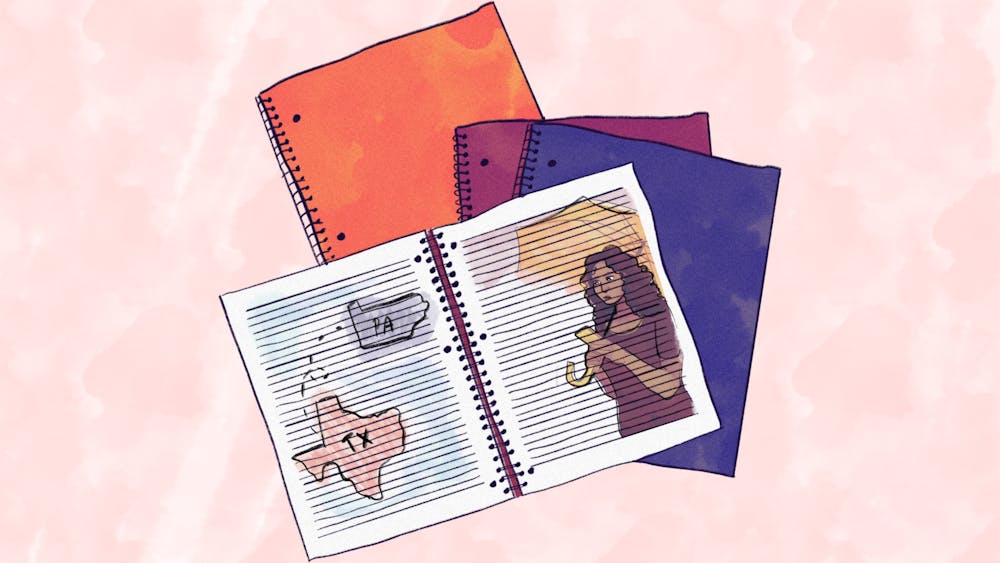I was walking through pouring rain when Bean called to see if I wanted to work with him this summer. I had promised my mom that I would come home, a prospect I wasn’t entirely excited about—it would mean reinstated curfews and the self–imposed house arrest of the 110 degree Texas heat. Bean had been a mentor for me throughout high school, and when he first offered me the job, I was tentative. In many ways it felt like a step backwards: I’d be working with a local nonprofit to help coach a youth slam poetry team, a program I’d been a part of all throughout high school. When I went to college I wanted nothing more than to move forward, to leave behind everything I once was as a teenager in Sugar Land and re–emerge a metamorphosed girl. But here I was back again after my first year, in the same lifeless town, in the same small life.
My plans to spend summer on a beach studying primates were dashed when, by the middle of second semester, my mom insisted that I come back for the summer because she “was worried about me.” For good reason, too. On paper, everything seemed fine, but in the way only my mother could recognize, I was falling apart. I silently sobbed for no known reason in front of a friend at McClelland. I nearly transferred to Engineering. I had no clue who I was or what I was supposed to be. Part of that came from existential doom of the forthcoming “real world,” of an idealist suddenly coming to terms with the rat race. I met people my first week at Penn who were born to be dentists and actuaries at heart. My first week of school, someone laughed as they noted, “There’s no point in passions that can’t make money.” Those were basically all my passions.
That had never bothered me before. I had spent my high school years so deeply in love with passion, that I had never considered what came next. It was through the aforementioned nonprofit that my passion for poetry was nurtured. I had auditioned and joined their slam poetry team my first year of high school, and it became my second home. Every summer, I would spend most of my days at the repurposed house that had become their office. Through that community, I made some of my first real friends from all across Houston with experiences unlike mine in so many ways, yet all the same. It was with my team that I learned about colonialism, attended my first ballroom show, failed miserably at a cipher, and discovered that I was lactose intolerant.
Now as I returned, I found myself slowly reintegrated with a community that chose passions over anything else. I shot the breeze with Brandon Leake, discussed the nuances of the gig economy, and spent my evenings with people who had found something they loved and held on to it, despite living in a state that was making it harder by the day, cutting funding to programs like ours and limiting space for children to speak out.
I looked forward to my 30–minute commute to the city in the evenings, a journey that would inevitably stretch out to an hour on days with the worst of Houston construction. I found myself back in a place where, at every event or open mic, I was greeted by a hug. I spent evenings editing with a mouth full of rice crackers, emceeing slams with jokes that never quite hit, and coming home at 11 p.m. because I was at “work late” (which really meant I was at a bar for an open mic). This community had once made me who I was, even if I had forgotten. And now it was building me back up.
This was the opposite of how I intended to spend my summer—the same way I had spent it since I was 14. But, in another way, it was all new. I wasn’t spitting in the mic, I was setting up the sound system. Instead of writing the poems, I was editing them as the kids asked for help. We had moved to a new location, abandoning what I nicknamed the “asbestos” room after it had been condemned. I guess I had changed, too.
Yet here I was mentoring these kids as much as myself. Telling them to follow their passions even as I freshly emerged from the Penn storm that nearly made me a computer science major. Reminding them never stop writing, but answering the question of a new poem of my own with an “it’s complicated.” Once, Bean asked if I was still going to write that children’s novel I had been talking about since I started high school. I had forgotten about that.
I found it in my closet. A series of spiral notebooks that I had poured heart and soul into, then forgot I had hid my heart there, nineteen and fifteen and seventy and ten all in one. It’s hard to hold on when you don’t remember where you came from.







